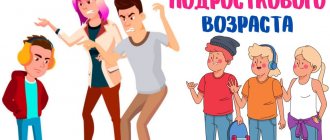The teenage crisis is considered one of the most difficult. Problems at this age can affect the rest of your life, because this is the time when a person moves from childhood into adulthood. Moments of growing up, as a rule, pass with emotional tension, it is difficult and difficult not only for others, but also for the teenager himself.
You will learn how to survive the crisis of 13-14 years as painlessly as possible by reading this article.
What happens to teenagers?
The first cause of the teenage crisis is puberty. Physiological changes in the body affect the mental and emotional state of a teenager and cause emotional problems. Young people experience increased excitability, nervousness, irritability, and loss of strength.
A guy or girl experiences new experiences for them: sexual desire (often unconscious), interest in the opposite sex, sexual interest. Teenagers begin to feel like adults and try in every possible way to resist their parents and teachers. Adults often observe the following picture: their children in adolescence seem to deliberately begin to resist the outlined boundaries, trying to push them apart.
Children want to violate established norms and rules, which naturally causes conflict with their parents.
In a clash with adults, teenagers study themselves, their capabilities, try to assert themselves and show what they are capable of. Psychologists say that there may not be a crisis at the age of 13-14 years, but this is fraught with serious violations in the future:
- Young people will experience all the delights of the crisis at a later age (18-20 years old), and this can lead to negative consequences in later life.
- Infantilism, the position of an “adult child”, which can last for many years.
It is necessary to take into account the fact that crisis symptoms do not appear constantly; rather, these are episodic moments when a teenager wants to resist adults and their rules.
Biological background
We are still quite a bit away from relatives with furry sides, many of our feelings are four-legged, and others even have fins.
Igor Guberman
Let's look at how this happens in our closest biological relatives - the great apes. Often such a comparison helps to understand the origins of many human problems. After all, no matter how much we would like to think otherwise, the laws of biology also apply to us. Despite all our rationality, no one has canceled our instincts, although we try to find rational explanations for our actions.
When the cubs of other primates (and humans are primates) reach puberty, they begin an independent life, for which they are already quite ready.
Humans, unlike other primates, build permanent families of one man and one woman. And when their child turns into a teenager (and in fact, into a sexually mature person), conflicts often arise between him and his parents. After all, our instincts tell us that there should not be two adults of the same sex in the same family. Instinctively, unconsciously, competition arises between a parent and a child of the same sex, and conflicts with a competitor are inevitable. Sexual attraction develops between a child and a parent of the opposite sex. And since it is forbidden and unconscious, a defense mechanism in the form of conflict behavior begins to work, just as unconsciously.
In addition, regardless of gender, we simply find another adult on our territory. And this person behaves on our legal territory not as a guest, but as a host, he demands a separate room, and even asks not to enter without knocking. His instinct demands his territory, and ours indignantly rushes to protect us from encroachments on our territory.
You may find it hard to believe what you just read. You most likely have not noticed this in your life. But keep in mind that we have all learned to behave decently and rationally explain our own actions to ourselves. And unconscious passions boil, sometimes breaking out and causing a greater storm, the less we are aware of our instinctive motives. Therefore, it is better to take into account and control our biological nature than to give it complete control out of ignorance.
Phases of the teenage crisis
The crisis of 13-14 years is one of the most serious and difficult stages in human development. Psychologists identify several main phases of a crisis:
- Pre-critical (negative), when a teenager begins to break stereotypes, he realizes that the rules that parents have built for many years can be broken.
- Climax. The peak, as a rule, occurs at the age of 13-14 years, but this line is very arbitrary, since the peak can occur at any age for any person.
- Postcritical. The teenager draws his own conclusions, builds new relationships, and forms his own rules.
Physical development at 12 years old
Age 12 is somewhere between the age when girls begin puberty. In addition, at the very beginning of typical age, a boy also begins to go through this process.
In girls, you will notice breast growth, hair growth and finally menstruation. In boys, puberty begins with an enlargement of the penis and testicles, followed by pubic and armpit hair growth, followed by facial hair growth, muscle growth, and a deepening of the voice.
Major milestones
Begins to show signs of puberty, including menstruation in girls and muscle development in boys. Becomes increasingly proficient at sports Experiences a growth spurt
Advice for parents
Now is not the time to turn a blind eye to your teen's growing sexuality, although it is a hard road down. So if you need help starting a conversation, talk to your healthcare provider about how to broach the topic with your child.
When should puberty start in girls and boys?
Causes of the crisis
In addition to puberty, psychologists name several other reasons why the teenage crisis begins:
- Development of your own consciousness. The child makes increased demands on himself and others, but often they are too high. In this case, the formation of personal complexes occurs, since adolescents are not yet ready to accept full responsibility for their own actions. Because of this, children's relationships with parents, peers, and teachers may deteriorate.
- Adult supervision. 13-year-olds consider themselves adults who can make informed decisions without asking for help. In fact, this is not always possible, because teenagers still have little life experience. When adults (parents, teachers) impose any prohibitions, the teenager defiantly violates them, and often finds himself in a funny, absurd situation. Adults want the best for children, so they are angry that their opinions are not listened to, and teenagers feel that they are considered children. Hence the confrontation and open conflict.
- Self-affirmation. Children aged 13-14 years old want to prove to the whole world and themselves that they are unique, inimitable, and talented. Teenagers often develop false ideals that they strive to be like. When the realization comes that nothing is working out, harsh self-criticism begins, a feeling of powerlessness, self-criticism drops to zero.
Two steps forward - one step back
The child develops without going through a series of crises. After each crisis, he is ready to go further into the world and needs his parents less and less. But if something goes wrong, if the child cannot cope with life, he can go back a little - to a previous stage of development, in order to come to his senses next to the source of love and care - next to his mother, father, grandmother. A one-year-old baby asks to be held in our arms like a baby, a first-grader climbs onto our laps, a ten-year-old takes us by the hand.
A teenager can also “fall back into childhood” a little, or “regress,” as psychologists say. If he is stressed or experiencing failure, he may begin to act like a child. Come to us to drink tea with sweets (although he has long preferred to sit in his room), ask to watch a cartoon together, and even lie in his parents’ bed, as he once did. It just might mean that he needs more protection and care, that he is going through a difficult period and needs to be close to him. He will be saturated with our warmth, calm down, and move forward again.
Signs of a teenage crisis
For some, the teenage crisis goes unnoticed, while others experience serious problems with communication. Psychologists identify common signs of a crisis:
- conflict in relationships;
- desire to be alone;
- preference for virtual conversations;
- the teenager wants to communicate with friends, runs away from home, ignores his parents;
- emotional imbalance;
- mood swings;
- hot temper;
- desire for privacy;
- aggression;
- dissatisfaction with oneself and others;
- anxiety, increased anxiety;
- low self-esteem;
- increased demands on one’s own personality;
- deterioration in academic performance.
Psychologists call negativism the main sign of a teenage crisis. Children see everything in a negative light: everything is criticizable, adults irritate them, the world around them is painted in black tones.
What to do if your child is going through a teenage crisis?
Despite the fact that parents of teenagers are very worried about their children, no specific treatment will be needed. You need to turn to specialists when a teenager’s behavior gets out of control, which can affect the development of his personality in later life.
Advice from psychologists to parents of teenage children:
- Try to find compromises. Communicate more with your children to understand how and what they live with. Look for common interests, because you probably have something to talk about over a cup of tea.
- Try to stick to general family rules, such as having dinner together at a large table.
- It is important for parents to adhere to these rules, otherwise the teenager will quickly understand what can be broken.
- Discuss all important family matters with your children. Be interested in their opinion, listen to it, so that teenagers realize that their word means something.
- Don't get upset, talk calmly, be patient.
- Try to become interested in your son/daughter's hobbies. Let's say your son is into hard rock.
- Listen to the concert of your favorite artist with him, do not criticize, do not speak negatively. Respect your child's interests!
- Praise for every achievement, say that you are proud of your son/daughter’s success. No matter what, it is important for a child at any age to hear words of praise from their parents.
- Spend more time with your teenager. Forget about household chores, go shopping, sit in a cafe together, discuss the news, have a heart-to-heart talk. It is very important for children to feel the emotional and physical closeness of their parents, so take the time to spend some time together.
- Try to remain an authority figure for your child, while maintaining friendly relations. In adolescence, it is so important that parents understand and accept the position of their children.
- Ask teachers and school psychologists more often about your children’s affairs.
Overcoming a crisis period: advice from a psychologist
Take advice from a psychologist. What will help overcome the crisis?
To do this, the child will have to complete a number of tasks:
- Positive relationships with peers, friendships.
- Accepting your own appearance.
- Acceptance of one’s gender, awareness of what the female and male social roles are.
- Friendly, trusting contact with parents.
- Acquiring responsibility and initiative.
- Awareness of your abilities, choice of profession.
Without the help of parents, it is difficult to get through the crisis safely. Father and mother should recognize that their child is a separate, independent person. Change your behavior model if you see acute rejection of the previous model.
The above completed tasks indicate that the crisis has been overcome. The role of parents in this is great - a lot depends on their behavior. Does your son or daughter need advice or conversation? Don't push them away by thinking the problem is stupid and not worth bothering with. What is trivial to you can be incredibly meaningful to a high school student. Later he will understand the insignificance of the situation, but now it is of great importance to him.
Often a teenager unknowingly tests his parents’ strength. If you want to gain the authority and respect of your daughter or son, it all depends on your behavior. Prohibitions must be justified and observed. Warnings are real and implemented. It’s stupid to say: “I’ll kill you if you don’t come back on time and without warning,” or to threaten to “turn off the Internet” without subsequent implementation. The teenager begins to perceive all words spoken by his parents as empty. There is no longer any talk about authority and respect.
He should understand in advance what the consequences of violations are. Voice threats that you are ready and able to carry out - keep your word. For example, this could be deprivation of something for a certain time: computer games, watching TV, a short walk with friends, etc.
There's no point in getting carried away. Sanctions and punishments are extreme measures. It is much better if you establish a relationship of trust with your child. Trust, requests, a spirit of support, respect and cooperation are preferable to orders. It is difficult to achieve close and warm relationships if mistakes were made at the previous age stage.
What parents of teenage children should not do
- conflict with children;
- impose your opinion;
- speak in this tone: “You are not yet grown up to teach me,” “Listen to us, we are adults, and you are still a child,” “You don’t understand anything,” etc.;
- indulge all the whims of your children;
- raise your voice, throw tantrums, use physical punishment;
- criticize, humiliate;
- do not devote time to the child, citing being busy;
- lock houses, turn off the Internet, so that your daughter or son does not communicate with friends;
- get into the child’s personal space (read his correspondence, diary, constantly check his phone, social networks, etc.).
Cognitive development at 12 years old
The brain of a 12-year-old child has stopped growing in size, but is still far from developing. Abstract thinking, problem solving, and logic are becoming easier, 3 but the prefrontal cortex, which plays a role in impulse control and organizational skills, is still immature.
Speech and language
By age 12, most children are proficient in language and communication. They are able to think beyond literal interpretations, and proverbs and idioms no longer fly over their heads. You will probably feel sarcasm for the first time, and they will understand both the tone and language of the conversation.
Play
Twelve-year-olds begin to spend their free time in activities such as organized sports, video games, and social events with friends. Continue to monitor the amount of screen time your teen gets and encourage him to stay active even if he doesn't play organized sports.
Major milestones
- Understands and applies logic to situations and problems
- Learns about the concepts of fairness and equality
- Begins to understand cause and effect relationships
Advice for parents
Stay connected with your child's teachers—without being an inconvenience—and remain active in their academic life. Don't wait until the report card comes home with a bad grade to make sure your pre-teen child is doing as well as possible academically. If there are academic problems, find the root cause rather than getting frustrated as it could be anything from a vision problem to a learning disability.
What could be the consequences?
Teenagers who did not get help when they needed it may experience a lot of problems in adulthood:
- frequent emotional breakdowns;
- neuroses;
- psychological disorders;
- isolation, closedness;
- suicidal tendencies;
- craving for illicit drugs.
Parents should do everything possible to ensure that their child survives the teenage crisis with minimal losses. It will be much easier to overcome moments of crisis if parents adhere to proper upbringing from early childhood. By the age of 13-14, the child will know the basic rules, learn to adhere to them and develop communication skills. Emotional outbursts, unfortunately, cannot be avoided, but they will pass much easier if you set clear rules in advance and build friendly relationships with your children.
Read on topic: How to survive self-isolation with teenagers
Leave a comment
Not the most important thing
“We said that school fades into the background for teenagers. How to help your child cope with the school curriculum?
— Parents must understand that evaluation and testing, of which there are many now in the education system, are not always an indicator. For me, for example, the test format has always been difficult; for others, on the contrary, it seems easier than other forms of exams.
School and exams are just another stage in a child’s life. It is necessary to instill in the child confidence in his abilities, talk through options for the development of the situation. And often the parents themselves have too much anxiety.
To my surprise, I recently learned that even first-graders are now hired tutors to help them study better.
Both parents and teachers support some kind of general neuroticism about exams. In my practice, there have been several cases when children do not want to go to 10th grade just because there will be an Unified State Exam, and they think that they will fail.
Teenagers.
unsplash.com
-What is the child afraid of?
- It's bad. Parents themselves must understand that this is not a collapse in life, and convey this thought to the child. There are many cases where even a highly intelligent student fails his exams. This comes from the fact that he attaches fundamental importance to the assessment, and the panic that he will not pass completely turns off his brain.
Yes, in the situation of passing exams, stress can be a mobilizing factor. We are worried, but we pull ourselves together and answer correctly. But if the emotional load is too great, then so-called distress occurs, which blocks memory.
A person constantly experiences anxiety and fear and at the most crucial moment turns out to be unprepared. This is a defense mechanism of the psyche.
Teenagers.
unsplash.com











